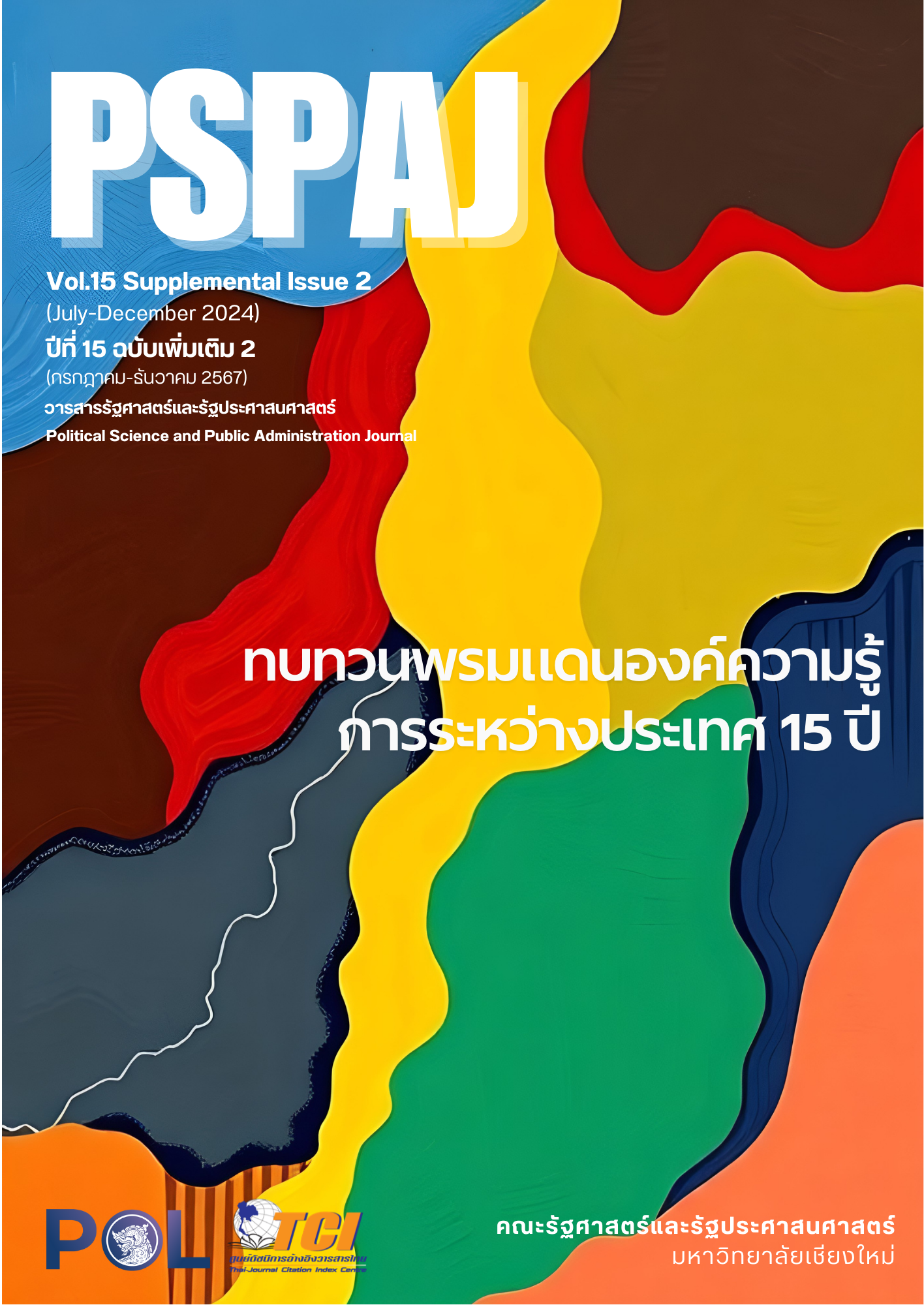ไร้กระบวนท่า?: สำรวจวิทยานิพนธ์ระดับปริญญาโท/เอกสาขาวิชาความสัมพันธ์ระหว่างประเทศในไทย
Main Article Content
บทคัดย่อ
นักวิชาการชาวไทยจำนวนหนึ่งได้พยายามสำรวจและทบทวนสถานภาพสาขาวิชาความสัมพันธ์ระหว่างประเทศของไทย ซึ่งโดยมากมักเสนอความรู้ความเข้าใจว่าแวดวงวิชาความสัมพันธ์ระหว่างประเทศในไทยเน้นไปที่การผลิตงานเชิงนโยบายตามโจทย์ของผู้มอบทุนวิจัย อีกทั้งยังถูกครอบครองพื้นที่ของการศึกษาโดยสำนักคิดแบบสัจนิยม (Realism) บทความวิจัยชิ้นนี้มุ่งที่จะสร้างความกระจ่างดังกล่าวโดยพิจารณาฐานข้อมูลของวิทยานิพนธ์ระดับปริญญาโทและปริญญาเอกที่เกี่ยวข้องกับสาขาวิชาความสัมพันธ์ระหว่างประเทศในไทยนับตั้งแต่ ค.ศ. 1958-2022 บทความวิจัยชิ้นนี้อาศัยวิธีการวิเคราะห์เนื้อหา (Content Analysis) เพื่อสร้างเกณฑ์ในการจัดระเบียบรวมถึงวิเคราะห์ฐานข้อมูลของวิทยานิพนธ์ของสาขาวิชาความสัมพันธ์ระหว่างประเทศ ซึ่งบทวิเคราะห์จะมุ่งไปที่สี่ประเด็นสำคัญที่เกี่ยวข้องกับ 1) รูปแบบการวิจัย 2) รูปแบบของกรณีศึกษา 3) กรอบแนวคิดสำหรับการวิจัย และ 4) ระเบียบวิธีวิทยา
Downloads
Article Details

อนุญาตภายใต้เงื่อนไข Creative Commons Attribution-NonCommercial-NoDerivatives 4.0 International License.
- เนื้อหาและข้อมูลที่ลงตีพิมพ์ในวารสารรัฐศาสตร์และรัฐประศาสนศาสตร์ถือเป็นข้อคิดเห็นและความรับผิดชอบของผู้เขียนบทความโดยตรง ซึ่งกองบรรณาธิการวารสารรัฐศาสตร์และรัฐประศาสนศาสตร์ ไม่จำเป็นต้องเห็นด้วย หรือร่วมรับผิดชอบใดๆ
- บทความและข้อมูล ที่ได้รับการตีพิมพ์ในวารสารรัฐศาสตร์และรัฐประศาสนศาสตร์ ถือเป็นลิขสิทธิ์ของวารสาร หากบุคคลหรือหน่วยงานใดต้องการนำข้อมูลไปใช้ประโยชน์ในทางวิชาการ ขอให้อ้างอิงแหล่งที่มาด้วย
เอกสารอ้างอิง
กุลลดา เกษบุญชู มี้ด. (2517). ธนาคารโลกกับพัฒนาการเศรษฐกิจของไทย (วิทยานิพนธ์รัฐศาสตรมหาบัณฑิต), คณะรัฐศาสตร์ จุฬาลงกรณ์มหาวิทยาลัย.
จุฬาพร เอื้อรักสกุล. (2529). กรณีมายาเกวซ: ศึกษาการตัดสินนโยบายในภาวะวิกฤตการณ์ (วิทยานิพนธ์รัฐศาสตรมหาบัณฑิต), คณะรัฐศาสตร์ จุฬาลงกรณ์มหาวิทยาลัย.
ธีวินท์ สุพุทธิกุล. (2564). การสอนความสัมพันธ์ระหว่างประเทศในไทย: วิเคราะห์เป้าหมาย แนวทาง และบริบทการถ่ายทอดความรู้สู่สังคม (รายงานผลการทำกิจกรรมส่งเสริมและสนับสนุนการวิจัย) (รายงานการวิจัย). กรุงเทพฯ: คณะรัฐศาสตร์ จุฬาลงกรณ์มหาวิทยาลัย.
ปรีชญา ยศสมศักดิ์. (2562). ซินเธีย เอ็นโลกับแนวทางการศึกษาเพศสภาพในความสัมพันธ์ระหว่างประเทศ (วิทยานิพนธ์รัฐศาสตรดุษฎีบัณฑิต), จุฬาลงกรณ์มหาวิทยาลัย.
พิชญสุดา พลเสน. (2560). โลกาภิวัตน์ทางวัฒนธรรมกับการแพร่ขยายของวัฒนธรรมสมัยนิยมอเมริกัน: กรณีศึกษาเครือข่ายธุรกิจอาหารจานด่วนในประเทศบรูไนดารุสซาลาม (วิทยานิพนธ์รัฐศาสตรมหาบัณฑิต), คณะรัฐศาสตร์ จุฬาลงกรณ์มหาวิทยาลัย.
พิชญ์อาภา พิศุทธ์เศรณี (2560). วิวัฒนาการของอาเซียน: สู่การเป็นประชาคมการเมืองและความมั่นคงอาเซียน? (วิทยานิพนธ์รัฐศาสตรดุษฎีบัณฑิต), คณะรัฐศาสตร์ มหาวิทยาลัยธรรมศาสตร์.
วราภรณ์ พรหมรัตน์. (2543). ความสัมพันธ์ระหว่างจีนกับอาเซียนทางด้านความมั่นคง: ศึกษากรณีจีนเข้าร่วมการประชุมอาเซียน ว่าด้วยความร่วมมือด้านการเมืองและความมั่นคงในภูมิภาคเอเชียแปซิฟิก (วิทยานิพนธ์รัฐศาสตรมหาบัณฑิต), คณะรัฐศาสตร์ จุฬาลงกรณ์มหาวิทยาลัย.
ศาสตร์ ชัยวรพร. (2549). แนวคิดหลังสมัยใหม่กับการศึกษาความสัมพันธ์ระหว่างประเทศ: ศึกษางานของริชาร์ด เค แอชลีย์ (วิทยานิพนธ์รัฐศาสตรมหาบัณฑิต), คณะรัฐศาสตร์ จุฬาลงกรณ์มหาวิทยาลัย.
ศิบดี นพประเสริฐ. (2560). อนุรักษนิยมไทยกับนโยบายต่างประเทศ (พ.ศ. 2516 - พ.ศ. 2521) (วิทยานิพนธ์รัฐศาสตรดุษฎีบัณฑิต), คณะรัฐศาสตร์ จุฬาลงกรณ์มหาวิทยาลัย.
ศุทธาวีร์ ลีสวรรค์. (2550). สัจนิยมของฮานส์ มอร์เกนธอ: ศึกษากรณีงานของมอร์เกนธอว่าด้วยนโยบายต่างประเทศสหรัฐอเมริกา (วิทยานิพนธ์รัฐศาสตรมหาบัณฑิต), จุฬาลงกรณ์มหาวิทยาลัย.
ศุภมิตร ปิติพัฒน์. (2550). ความสัมพันธ์ระหว่างประเทศ: พัฒนาการและความก้าวหน้าขององค์ความรู้ (คณะกรรมการสภาวิจัยแห่งชาติ สาขารัฐศาสตร์และรัฐประศาสนศาสตร์) (รายงานการวิจัย). กรุงเทพฯ: คณะรัฐศาสตร์ จุฬาลงกรณ์มหาวิทยาลัย.
เศรษฐ์ เหราปัตย์. (2502). การสัตยาบันสนธิสัญญา (วิทยานิพนธ์รัฐศาสตรมหาบัณฑิต), คณะรัฐศาสตร์ มหาวิทยาลัยธรรมศาสตร์.
สมโชค สวัสดิรักษ์. (2538). ความสัมพันธ์ระหว่างไทยกับพม่า: ศึกษากรณีปัญหาชนชาติกะเหรี่ยง ค.ศ. 1988-1994 (วิทยานิพนธ์รัฐศาสตรมหาบัณฑิต), คณะรัฐศาสตร์ จุฬาลงกรณ์มหาวิทยาลัย.
อธิป ศิวะศาสนพงศ์. (2548). ไทยกับการบูรณะฟื้นฟูอิรัก (ภายหลังเดือน พฤษภาคม พ.ศ. 2546) (วิทยานิพนธ์รัฐศาสตรมหาบัณฑิต), คณะรัฐศาสตร์ จุฬาลงกรณ์มหาวิทยาลัย.
อนุสรณ์ ชัยอักษรเวช. (2556). อาเซียนกับกระบวนการสร้างสถาบัน: จาก “ปฏิญญากรุงเทพฯ 1967” ถึง “กฎบัตรอาเซียน 2008” (วิทยานิพนธ์รัฐศาสตรมหาบัณฑิต), คณะรัฐศาสตร์ มหาวิทยาลัยธรรมศาสตร์.
อริญชย์วิชญ์ แสงนักธรรม. (2560). การบริหารจัดการทรัพยากรน้ำข้ามพรมแดนแบบบูรณาการ: กรณีศึกษา การบริหารจัดการอุทกภัยข้ามพรมแดนแบบบูรณาการในลุ่มน้ำกก ในช่วงปี พ.ศ. 2544-ปัจจุบัน (2559) (วิทยานิพนธ์รัฐศาสตรมหาบัณฑิต), คณะรัฐศาสตร์ มหาวิทยาลัยธรรมศาสตร์.
อาบีดีล กูโน. (2549). ปัจจัยที่มีอิทธิพลต่อการกำหนดนโยบายต่างประเทศของไทยต่ออิหร่าน: 2540-2548 (วิทยานิพนธ์ปริญญามหาบัณฑิต), คณะรัฐศาสตร์ มหาวิทยาลัยธรรมศาสตร์.
เอกลักษณ์ ไชยภูมี. (2566). ประวัติศาสตร์ภูมิปัญญาของจุดตั้งต้นการศึกษาการต่างประเทศไทย: ขนบแบบสมจัยกับแนวทางการศึกษาแบบประวัติศาสตร์. วารสารสังคมศาสตร์ มหาวิทยาลัยนเรศวร, 19(1), 231-265. https://doi.org/10.14456/JSSNU.2023.8
Acharya, A. (2014). Global International Relations (IR) and Regional Worlds: A New Agenda for International Studies. International Studies Quarterly, 58(4), 647-659. https://doi.org/10.1111/isqu.12171
Aydinli, E., & Aydinli, J. (2024). Exposing Linguistic Imperialism: Why Global IR Has to Be Multilingual. Review of International Studies, 1-22. https://doi.org/10.1017/S0260210523000700
Baele, S. J., & Bettiza, G. (2021). ‘Turning’ Everywhere in IR: On the Sociological Underpinnings of the Field’s Proliferating Turns. International Theory, 13(2), 314-340. https://doi.org/10.1017/S1752971920000172
Colaresi, M., & Mahmood, Z. (2017). Do the Robot: Lessons from Machine Learning to Improve Conflict Forecasting. Journal of Peace Research, 54(2), 193-214. https://doi.org/10.1177/0022343316682065
Colgan, J. D. (2016). Where Is International Relations Going? Evidence from Graduate Training. International Studies Quarterly, 60(3), 486-498. https://doi.org/10.1093/isq/sqv017
Gentry, B., & Stojek, S. (2020). “The State” of International Studies: Curriculum Design. PS: Political Science & Politics, 53(2), 349-354. https://doi.org/10.1017/S1049096519002191
George, A. L., & Bennett, A. (2005). Case Studies and Theory Development in the Social Sciences. Cambridge: MIT Press.
Gilens, M. (2000). Why Americans Hate Welfare: Race, Media, and the Politics of Antipoverty Policy. Chicago: University of Chicago Press.
Hogan, J. (2006). Letters to the Editor in the ‘War on Terror’: A Cross-National Study. Mass Communication and Society, 9(1), 63-83. https://doi.org/10.1207/s15327825mcs0901_4
Hug, S. (2018). Examples of Quantitative Data Processing in International Relations. In Devin, G. (Ed.). Resources and Applied Methods in International Relations (pp. 125-138). Cham: Springer International Publishing. https://doi.org/10.1007/978-3-319-61979-8_9
Kesboonchoo Mead, K., & Poonkham, J. (2019). The End of Thai International Relations?: A Plea For the Empirical Foundations of Critical Theory. In Na Thalang, C., Jayanam, S., & Poonkham, J. (Eds.). International Relations as a Discipline in Thailand: Theory and Sub-fields (pp. 240-258). New York: Routledge.
King, C. (2015, July 1). The Decline of International Studies: Why Flying Blind is Dangerous. Foreign Affairs, 94(4), 88-98. https://www.foreignaffairs.com/articles/united-states/decline-international-studies
Kristensen, P. M. (2016). Discipline Admonished: On International Relations Fragmentation and the Disciplinary Politics of Stocktaking. European Journal of International Relations, 22(2), 243-267. https://doi.org/10.1177/1354066115586206
Lake, D. A. (2013). Theory is Dead, Long Live Theory: The End of the Great Debates and the Rise of Eclecticism in International Relations. European Journal of International Relations, 19(3), 567-587. https://doi.org/10.1177/1354066113494330
Levy, J. S. (2008). Case Studies: Types, Designs, and Logics of Inference. Conflict Management and Peace Science, 25(1), 1-18. https://doi.org/10.1080/07388940701860318
Na Thalang, C. (2019). Why are Conceptual and Theoretical Discussions More Common in Thai Politics Than in IR in Thailand?: Comparing and Reflecting on the State and Status of Politics and IR in Thailand. In Na Thalang, C., Jayanam, S., & Poonkham, J. (Eds.). International Relations as a Discipline in Thailand: Theory and Sub-fields (pp. 230-239). London and New York: Routledge.
Na Thalang, C. (2022). Advancing Global IR from a Thai Perspective: Opportunities for Pre-theorization and Conceptualization. Contemporary Southeast Asia, 44(2), 250-273.
Prasirtsuk, K. (2009). Teaching International Relations in Thailand: Status and Prospects. International Relations of the Asia-Pacific, 9(1), 83-105. https://doi.org/10.1093/irap/lcn018
Schreier, M. (2012). Qualitative Content Analysis in Practice. London: SAGE.
Sil, R., & Katzenstein, P. J. (2010). Analytic Eclecticism in the Study of World Politics: Reconfiguring Problems and Mechanisms Across Research Traditions. Perspectives on Politics, 8(2), 411-431. https://doi.org/10.1017/S1537592710001179
Thomas, K. (2024). The Advent of Survey Experiments in Politics and International Relations. Government and Opposition, 59(1), 297-320. https://doi.org/10.1017/gov.2022.36
Wang, H., & Wang, X. (2023). Sentiment Analysis of Tweets and Government Translations: Assessing China’s Post-COVID-19 Landscape for Signs of Withering or Booming. Global Media and China, 8(2), 213-233. https://doi.org/10.1177/20594364231181745


